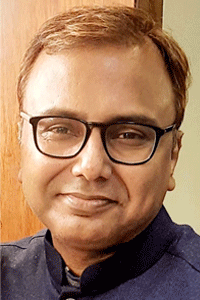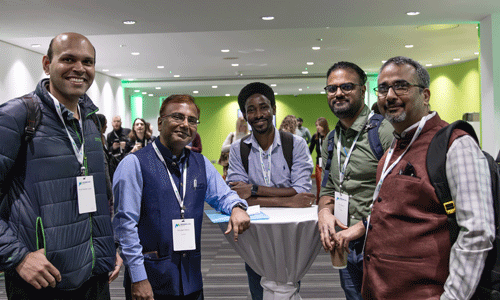Global Diversity Awareness Month: Arindam Mitra
Posted on October 30, 2024 by Microbiology Society
Celebrated annually during the month of October, Global Diversity Awareness Month aims to promote understanding and appreciation of diversity in all forms, including race, ethnicity, gender, sexual orientation and abilities. The month encourages conversations and activities that highlight the importance of inclusivity and the value that different perspectives have in fostering a more equitable global community. We caught up with Society Champion and Members Panel member, Arindam Mitra, who shared his insights and discussed how diversity has shaped his personal and professional journey.

As an international member of the Microbiology Society and a Professor of Microbiology from Kolkata, India, Global Diversity Awareness Month is my time to celebrate the powerful intersections of culture, science, and shared knowledge. I am proud to celebrate the varied perspectives, backgrounds and experiences that we each bring to the Society. Embracing this diversity not only fosters innovation but also builds a supportive and inclusive community, where every voice contributes to advancing our field. The field of microbiology thrives on diverse perspectives! My journey from Kolkata, India, to Maryland and Arizona in the USA, then eventually back to Kolkata, has enriched my perspective on diversity. As an international member of the Microbiology Society, located in the UK, this month is a time of reflection on my journey and the diverse roles I have so far embraced.
Moving to the University of Maryland, College Park, USA, as a graduate student from Kolkata, India, was both exciting and challenging. The weather change was striking – comparing Kolkata’s humid, tropical climate to Maryland’s snowy winters. Culturally, Kolkata’s communal spirit, evident in festivals like Durga Puja, differs from the more individualistic and reserved social dynamics in the USA. Although English is spoken in both countries, I had to adjust to the American accent and idioms. In Kolkata, the mix of Bengali, Hindi and English provides a familiar comfort, whereas in America, English is the primary language, requiring me to learn new expressions quickly. Overall, every aspect of this transition was a valuable learning experience, highlighting the beauty of diversity in both Kolkata and College Park.
Moving from College Park, Maryland, to Tempe, Arizona, marked an exciting new chapter filled with changes. One of the biggest adjustments was the weather. Maryland’s snowy winters and humid summers were replaced by Arizona’s intense heat and mild winters. Culturally, the contrast is striking. While Maryland has a bustling East Coast vibe, Tempe offers a more laid-back atmosphere, influenced by Native American and Hispanic cultures, evident in its festivals, art, and cuisine. Regional expressions and accents add to Arizona's unique character. Professionally, transitioning from a graduate student to a postdoctoral researcher has been transformative. The academic environment in Tempe encourages interdisciplinary collaboration and innovation, inspiring me to think in new ways. Each location enriched my journey, shaping my academic path and adaptability.
Transitioning from the desert landscapes of Tempe, Arizona, to academic life as an Assistant Professor in India, has been a rich experience. Tempe’s dry, sunny weather contrasts sharply with India’s diverse climate, ranging from monsoon rains to humid summers. Culturally, the shift is significant. In America, the academic settings often promote a casual, open-door approach, while in India, respect for hierarchy and formality are highly valued. Connections with students and staff are also typically more personal and community-oriented. Language has been an adjustment as well. While English is dominant in Indian academia, daily interactions often involve regional languages. The vibrant festivals and family gatherings create a warm atmosphere, but also require a new balance between professional and personal interactions. This transition has broadened my perspective, enriching my teaching style and research approach with both Western academic values and the communal spirit of Indian academia.
As an international member of the Microbiology Society, I have served in diverse roles, from championing microbiology across borders, to serving on the Microbiology Today editorial board, Sustainability Committee, Members Panel and Advisory Council – with each role deepening my appreciation for the richness of perspectives that international voices bring to our field. As a Champion, I have had the privilege to advocate for microbiology’s impact in India, bridging local insights on microbial challenges with global advancements. I have had the opportunity to organise workshops, seminars and conferences at my current university since 2017. Organising these events has given me an appreciation for the diversity of microbiologists, both at local and global levels.

Previously serving on the Editorial Board for Access Microbiology and currently on the Editorial Board for Microbiology Today, these roles have allowed me to shape the diverse representation of publications worldwide. My role on the Members Panel has been particularly meaningful, as the Panel addresses matters of equality, diversity and inclusion within the microbiology community. Working with the Panel has allowed me to explore various ways the Society can become more inclusive to the community of microbiologists and beyond. My role as a Sustainability Committee member has also enabled me to realise the importance of developing financial resilience in the Society. As a member of the incoming Advisory Council, I will be working alongside colleagues to amplify international voices and ensure that the Society’s initiatives are inclusive and resonate with a global membership. This will foster collaborative innovations that are deeply relevant and impactful worldwide.
Being part of such a globally inclusive community, reinforces the importance of diverse voices in advancing microbiology, reminding us all that science flourishes best when it’s woven from many different threads. This journey has been incredibly fulfilling, and is a reminder to me that diversity is our strength and that our collective efforts drive meaningful change in the world of microbiology.
To find out more about our EDI initiatives and take part in an upcoming Awareness Day, view our equality, diversity and inclusion webpages.
